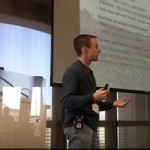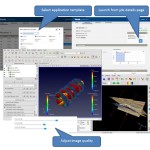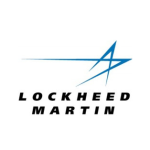“Fred brings to Cray a proven track record of building strategic partnerships and increasing sales through a customer-centric view of the market,” said Peter Ungaro, president and CEO of Cray. “Fred’s background at industry-leading technology companies is perfectly tailored for this position. His experience and insight will help us as we work to continue our growth as a company, and bring to our customers the promised convergence of the exciting worlds of supercomputing and big data.”
Archives for February 2016
Video: Node Health Check (NHC) Project Update
In this video from the 2016 Stanford HPC Conference, Michael Jennings from LBNL presents: Node Health Check (NHC) Project Update. “In this follow-up to his 2014 presentation at the Stanford HPCAC Conference, Michael will provide an update on the latest happenings with the LBNL NHC project, new features in the latest release, and a brief overview of the roadmap for future development.”
Code Modernization for Smarter Geophysics
Today Allinea announced plans to champion what it sees as a key survival message for the Energy industry when it exhibits at the Rice Oil and Gas HPC Conference in Houston next week. “We’ll be underlining to geophysicists at the conference the real commercial gains to be had from focusing on code performance,” said Robert Rick, Allinea’s VP of Sales, Americas. “HPC is helping the industry to operate more efficiently. The next step is for this market is to use code optimization to speed up the valuable seismic imaging and reservoir modeling processes, which are now essential to this industry.”
Adaptive Computing steps up with High Productivity Remote Visualization
Today Adaptive Computing announced it has integrated Remote Visualization with Moab’s workload submission portal, Viewpoint, in order to improve ease-of-use and increase user productivity. “Adaptive Computing is transforming our customers’ experience so that technology is no longer a barrier and users are more empowered in their efforts to cure cancer, build safer vehicles, and better our overall environment,” says Marty Smuin, CEO of Adaptive Computing. “This latest innovation helps automate the experience in such a way that organizations can both reduce costs through sharing and improve productivity through faster application interaction and increased collaboration.”
Video: Using HPC to Advance Water Desalination By Electrodialysis
“Electrodialysis is a technology used for water purification in applications such as desalination for drinking water, waste water reuse, and demineralization. An electrodialysis system uses ion-selective membranes and applied electric fields to remove ions from aqueous electrolytes. High performance computing allows us to model the electrokinetic interactions that drive this process, providing insight on important underlying physics such as electroconvective chaos which has a significant effect on ionic transport and the prediction of mean quantities.”
Industry Experts Discuss Accelerating Science with Storage Systems Research
In this special guest feature, Ken Strandberg describes the highlights of panel discussion on high performance storage at SC15. “There was significant discussion about identifying the most important workflows, e.g. will checkpoint/restart continue to dominate I/O demands, difficult to analyze scientific datasets, or some new emerging science workflows. In identifying these workflows, we expect to learn where to focus storage research.”
STEM IP – Advancing HPC, Industry & Society
“When it comes to commercialization of promising IP, HPC punches below its weight. That, we can and should change. Where does the HPC community get training on entrepreneurship? How do you become an entrepreneur? Does it have to be in your blood, or can you actually learn how to do it? It turns out you can learn most of it, and in the process (since nobody is excellent at everything), you also learn how to surround yourself with others who are good at other necessary things.”
Will the Cloud Change Scientific Computing?
“What is important to researchers is ‘time to science,’ not the length of time a job takes to compute. ‘If you can wait in line at a national supercomputing center and it takes five days in the queue for your job to run, and then you get 50,000 cores and your job runs in a few hours, that’s great. But what if you could get those 50,000 cores right now, no waiting, and your job takes longer to run but it would still finish before your other job would start on the big iron machine.”
Video: HPC, Deep Learning and GPUs
“From image recognition in social media to self-driving cars and medical image processing, deep learning is everywhere in our daily lives. Learn about recent advancements in deep learning that have been made possible by improvements in algorithms, numerical methods, and the availability of large amounts of data for training, as well as accelerated computing solutions based on GPUs. With GPUs, great performance can be reached across a wide range of platforms, from model development on a workstation to training on HPC and data-center systems to embedded platforms, enabling new horizons for computing and AI applications.”
Job of the Week: Supercomputing Systems Administrator at Lockheed Martin
“This Lockheed Martin Enterprise Business Services (EBS) position performs as a Systems Administrator supporting Lockheed Martin Aeronautics Information Technology. The position is a High Performance Computing/Super Computing Systems Administrator who will be required to maintain smooth operation of multi-user computer systems, including coordination with Network Services, Storage Administrators, Security, Vendors, and Research Scientists.”













